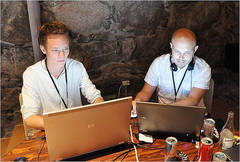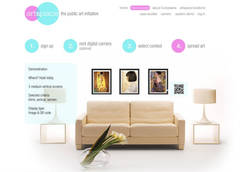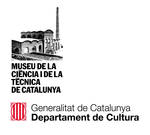25 June 2012
Hackers win EU award for digitised culture sharing ideas
Hack4Europe 2012 invited more than 40 web developers, programmers and designers to develop new ways of sharing, re-using, creating or opening-up access to the 23 million digitised objects on www.europeana.eu. The three selected winner presented their work at the Digital Agenda Assembly
Pin your favourite European masterpiece to your digital notice board. Discover Europe's cultural heritage on LCD screens at your gym or café. Create and share personal art guides on your smartphone. European web developers have come up with these ideas at Hack4Europe, competition that took place between 26 May and 15 June with events in Warsaw, Riga and Leuven.
The jury selected one prototype from each event to go forward to the Digital Agenda Assembly, where the winners were presented with their prize by Adriana Ticau, Member of the European Parliament.
The selected work for Belgium, Stackathon, is a mobile app that allows users to search and select artworks in Europeana: using their phone as a recording device, visitors of Europeana can add audio comments artworks and share them online. The application was developed by Senne Van Der Bogaert, Mehmet Celik and Wouter Aerts.
The Latvian event awarded Europ.in, application developed by Eriks Remess, Maksim Berjoza and Uldis Bojars that makes searching, navigating and sharing Europeana content more fun. Search results are displayed in a way which tempts users to explore further or get the details about an individual record.
The winner of the Warsaw hackathon was Artspace. The application aims to bring Europeana's collections into coffee shops, libraries, schools, hotels, clubs and other public places through LCD displays and an online Collection Management System that enable a “Virtual art leasing” service and was developed by Agata Dziekan and Marek Sredniawa.
Hack4Europe 2012 was organised by Europeana, launched in 2008 to make Europe's cultural heritage accessible to all, and its partners, National Audiovisual Institute, Poznań Supercomputing and Networking Centre, National Library of Latvia, TechHub Riga and Microsoft Latvia.
Aim of the events was to expand the reach of Europeana, Europe's digital library, museum and archive and to support the European Commission's policy to facilitate the wider deployment and more effective use of digital technologies.
After that Member States have been challenged to develop solid plans and build partnerships to place 30 million objects in Europeana by 2015, the initiative has grown to a mature ecosystem of 23 million paintings, films, recordings, photographs and archival records from over 2500 partner institutions.
Developers had the chance to access Europeana´s collectrion, Europeana Search Application Programming Interface (API), digitised WW1 memorabilia collected during Europeana's WW1 road shows in spring 2012 and Europeana Linked Open Data Pilot datasets, which currently comprise about 2.5 million Europeana records available under a CC0 license, in order to develop marketable applications and demonstrate the power of opening up cultural data.
Source: Europa.eu
Hack4Europe! Road Show, 7-11 June 2011 from Europeana on Vimeo.
back








